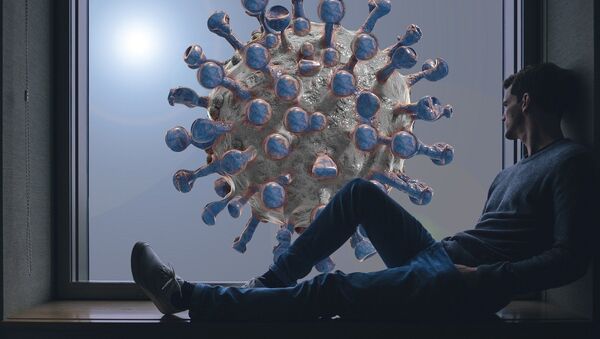The novel coronavirus is having a profound and potentially a long-term impact on mental health, especially in India where psychological disorders are often stigmatised and seen as taboo.
A recent survey by the Indian Psychiatry Society claims that there has been a dramatic rise of 20 per cent in cases of mental illness in stark contrast with the findings of World Health Organisation (WHO) report conducted before the outbreak of COVID-19 in 2019, that revealed that just 7.5 percent of Indians suffered from mental disorders.
Shreya Singhal, a psychologist, predicts that post coronavirus, people around the world might have post-traumatic stress disorders (PTSD) where they will become more cautious of their surrounding, and continue to practice social distancing and self-isolation. Some may carry the burden of mounting grief, feelings of helplessness and the fear of uncertainty but at the same time he says that gratitude and finding our strengths will have a long-term positive impact on our well-being.
The Future Wouldn’t be the Same
Singhal, a Psychologist for Child and Adolescent Mental Health in India’s leading hospital chain Max Healthcare, spoke to Sputnik about preparing children for the future and said that our way of life may change forever.
“We are now in a time, where meeting friends or family that we care for deeply is considered almost ‘life-threatening’. The current situation may have a long term impact on most of us in different ways,” says Singhal.
She adds that the transition can be difficult for most. “It is important for parents to be aware of their own emotions and mental state as the children pick cues from adults around them. Hence, some lifestyle changes should be considered for both, parents and their children.”
Dr. Jawhar Singh, Psychologist with country's apex hospital and research centre AIIMS, who is also treating the mental health issues of COVID-19 patients, states that in these crucial times it is important for families to come together and spend more time with each other, if not physically, then virtually.
“As patients are coming out of quarantine after 15 days, they might suffer mild depression. When they return to their homes they can isolate themselves, the public and family should not isolate them,” says Singh.
Enlighten Children About 'New Normal'
It is important for parents to utilize this crucial time at home to strengthen their bond as caregivers and as a family, to build trust and effectively communicate with their children and change their habits for long term, stresses Singhal.
“Taking time to talk and answer their questions about the ‘new’ normal will foster a sense of control in them in the long run. The first step could include taking time to educate their children about basic hygiene such that the child is able to draw a line between compulsive and healthy hygiene. Discussing with them healthy boundaries and the temporariness of the situation is important. This will teach them to remain resilient and positive in times of change,” she adds..
Among adults, Dr. Singh also highlight the importance of communication within the family and said the family members should become more vigilant and identify the symptoms of mental health problem in another member. He stated that a patient consumed by disease might not identify the problem, hence, the family should.
Rise in Depression, Pessimism, Insomnia
As a psychologist for children and adolescents, Singhal recognises that children are more vulnerable to mental health issues due to drastic changes in lifestyle, ‘what if’ thoughts and uncertainty about their future. Teenagers in school, having career defying exams or preparing for a specific goal will also suffer a huge setback due to the lockdown as many fear taking a sabbatical year.
“In clinical settings, we have seen a rise in concerns related to symptoms of anxiety, low mood and irritability. This could be attributed to various reasons including a sudden change in lifestyle including disturbed sleep and appetite, spending more time online, fear of uncertainty and ‘what if’ thoughts related to what may happen next, feeling lonely or overwhelmed. This has been seen more in adolescents graduating high school with concerns related to their future,” explains Singhal.
Dr. Singh echoes the Singhal and adds that the coronavirus pandemic has not only led to issues of anxiety and depression but also to an increase in suicidal tendencies in the people.
“The paranoia around the coronavirus and fear of infecting the loved ones is hampering the mental of the people. Insomnia among the people has become a new normal due to lockdown and self-isolation. People are coming with symptoms of anxiety, depression and even with suicidal ideation due to coronavirus pandemic,” Dr. Singh adds.
On Sunday, a man attempted suicide at the Delhi government Safdarjung Hospital by jumping off the third floor, while screaming that he is COVID positive. The police later confirmed that he was suffering from mental problem and not coronavirus.
Any Solution?
“For the well being of the kids, it is important to set consistency and familiarity in their routines. Regular sleep-wake cycle, being active, taking out time to pursue hobbies and interact with family and friends is healthy. Also, encourage the child to understand their priorities, be their own person and most importantly, be kind to one another,” Singhal continues.
Meanwhile, state governments across the country are setting up mental help health centres and giving dedicated counselling to COVID-19 patients. The government has also set up round-the-clock helpline numbers for COVID-19 related queries.
Similarly, a digital initiative, known as 'Awareness Series: Coping Up' has been launched by Aakshat Sinha and Preeti Singh in which mental health specialists answer questions through Instagram Live.
Sharing is Caring?
The moral of sharing is caring, which should get a broader and whole new meaning as it should not be confined to physical space but also to an emotional sense, says Dr. Singhal.
“Sharing may not only refer to physical space or things but the sentiment associated with it. I think the simple value of sharing is caring is vital and if a global crisis like this can teach us anything, it is that we can only get through difficult times when united and looking out for one another.”
When asked whether handshake should happen between children, the psychologist states that it has been the most widely practised greeting, however, we can help children and adults find friendly alternatives until there is more certainty and information.
“Other countries are now accepting the Hindu greeting ‘Namaste’ with hands pressed together in a prayer pose. Others are practicing gestures such as tapping their elbows with a friendly smile,” she concludes.





